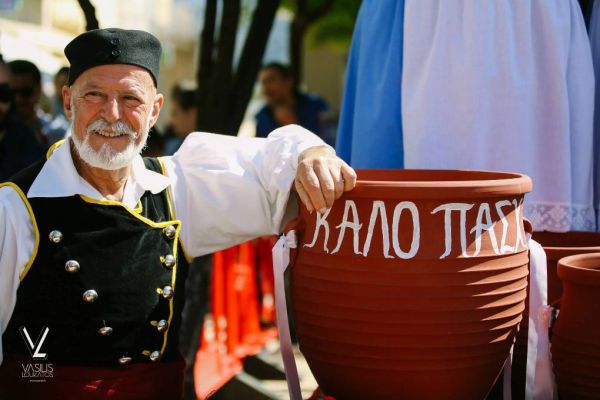The custom, widespread in all the Ionian Islands but particularly felt in Corfu, seems to have its roots in the period of the Venetian occupation. The Venetian custom of breaking old jugs on New Year's Eve to close the old year and start the new one without burden could in fact have been adopted by the locals and transferred to Easter celebrations.
In an interesting article published on portoni.gr, Gerasimos Sot. Galanos points out that the noise of the shattering vessels, as well as the production of loud sounds during religious celebrations, is also intended to represent the earthquake that opened the Holy Sepulcher marking the victory of life over death. The terracotta of which the vases are made could remind us that, according to the Bible, God created man with the earth. The breaking of the vase on the ground therefore evokes the liberation of the spirit from the body. Galanos also suggests that the tradition of breaking pots may have much older roots. Already in the Minoan period in Crete it was customary to break vases on the eve of a wedding, a tradition that is still found today in the breaking of plates and glasses. Even in the Middle Ages it was customary to break the vases to drive away evil; medicinal herbs at the time were kept in jars and, upon someone's recovery, the act of breaking the jars represented an act of celebration for the victory over evil. The hypothesis of a pagan origin of the rite of breaking the vases is also supported by the fact that in spring new vases are needed to collect and preserve leaves and fruit. Finally, the breaking of terracotta pottery could have its roots in an ancient funerary rite, also preserved in the Byzantine era. When the body of a deceased leaves his home, a plate is broken outside the door to prevent, through the noise produced, evil from entering this phase of transition between the world of the living and the world of the dead. In Kefalonia the custom of breaking vases was celebrated regularly until the beginning of the 18th century and then disappeared. It has made a comeback in recent years, as well as in the other Ionian Islands, also as an entertainment proposal for tourists. In the village of Monopolata the breaking of the vases takes place in the church of Agia Paraskevi immediately after the announcement by the pope that Christ is risen, accompanied by songs and celebrations. An event experienced with respect for the Orthodox tradition and an interesting ceremony for those visiting the island at this special time of the year.
Sources: portoni.gr, kefaloniapress.gr, ekefalonia.gr, proini.news

